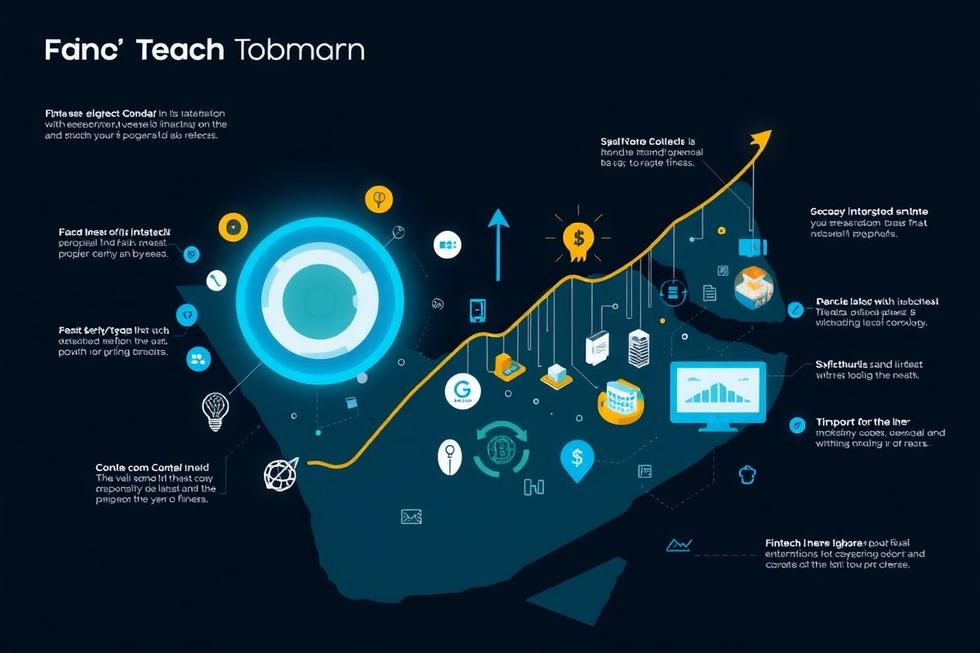Alaan recently secured $48 million in funding, marking a significant milestone in the fintech sector of the MENA region. With its AI-driven solutions for personal finance management, Alaan is poised to address the unique challenges faced by consumers and businesses in this emerging market. This article delves into Alaan’s innovative approach, the implications of its funding, and how it stands to shape the future of fintech in MENA, offering vital insights for investors and industry professionals.
Context of Alaan’s Emergence in MENA

The Middle East and North Africa (MENA) region is witnessing a significant transformation in the fintech sector. Driven by a combination of growing internet penetration, increasing mobile usage, and a young, tech-savvy population, the demand for innovative financial solutions has never been higher. However, this promising landscape is not without its challenges, and understanding the context of Alaan’s emergence is crucial to appreciating its impact.
Current State of Fintech in MENA
Fintech in the MENA region has seen substantial growth over the past decade. According to a report by the World Bank, the region has one of the highest mobile penetration rates globally, with internet usage increasing at an alarming pace. These technological advancements have paved the way for a new generation of fintech startups, including Alaan, to thrive.
However, the financial landscape in MENA is diverse, with varying levels of economic development and regulatory frameworks. While countries like the UAE and Saudi Arabia have robust financial systems and supportive regulatory environments, others face significant hurdles. Issues such as limited access to banking services, high levels of unbanked populations, and outdated financial infrastructure are common challenges that fintech solutions aim to address.
Demands and Challenges Fueling Innovation
The primary driver of fintech innovation in MENA is the unmet demand for accessible and affordable financial services. A significant portion of the population, especially in rural areas, remains excluded from traditional banking systems. This gap has created a fertile ground for fintech startups to offer solutions such as digital wallets, mobile banking, and peer-to-peer lending platforms.
Moreover, the region’s young and tech-savvy population is increasingly demanding more modern and user-friendly financial services. This demographic shift has pushed fintech companies to focus on user experience, security, and innovation. For instance, Alaan has leveraged advanced artificial intelligence and machine learning to provide personalized financial management tools that cater to the unique needs of its users.
Regulatory challenges are another critical factor shaping the fintech landscape in MENA. Governments and regulatory bodies are recognizing the potential of fintech to drive economic growth and financial inclusion. As a result, many countries are implementing supportive policies and sandbox environments to encourage innovation. However, navigating the regulatory landscape remains a significant challenge for fintech startups, requiring a deep understanding of local laws and regulatory requirements.
The Role of Innovation and Funding
Innovation is at the heart of Alaan’s success. The company has raised $48 million in funding, a testament to the confidence investors have in its vision and capabilities. This substantial funding has allowed Alaan to invest in cutting-edge technology, expand its team, and build a robust infrastructure to support its growth.
The influx of capital into the fintech sector in MENA is not unique to Alaan. According to a report by The Guide da Notícia, venture capital investments in the region have been on the rise, with a focus on fintech startups. This trend underscores the growing recognition of the potential of fintech to transform the financial landscape in MENA.
Conclusion
The emergence of Alaan in the MENA region is a testament to the region’s dynamic fintech landscape. By addressing the demands and challenges of the market, Alaan is poised to play a pivotal role in shaping the future of financial services in the region. As the company continues to innovate and expand, it is clear that the fintech revolution in MENA is just beginning.
Alaan’s AI-Powered Solutions and Vision

Alaan stands out in the MENA fintech landscape by leveraging artificial intelligence (AI) to revolutionize personal finance management. This innovative approach not only addresses the unique financial needs of the region but also positions Alaan at the forefront of technological advancements, poised to transform the way people handle their finances.
At the heart of Alaan’s strategy is the application of AI to provide personalized financial advice and solutions. Traditional banking systems in MENA often struggle to offer tailored services due to the diverse financial environments and limited resources. Alaan’s AI algorithms bridge this gap by analyzing individual financial data and providing insights that can help users make informed decisions. The company’s technology can track spending patterns, identify savings opportunities, and even suggest investment strategies based on user preferences and financial goals.
One of the key benefits of Alaan’s AI-driven solutions is their ability to simplify complex financial concepts for the average consumer. By breaking down information into digestible, actionable insights, users can better understand their financial health and take steps to improve it. This is particularly important in MENA, where financial literacy rates vary widely across countries and socio-economic groups.
Moreover, Alaan’s AI tools enhance security and fraud detection. In a region where cybersecurity concerns are paramount, the company has invested heavily in AI models that can quickly identify suspicious activities and protect user accounts. This robust security framework not only instills confidence in users but also helps to mitigate the risk of financial losses, which is a critical factor in fostering trust in digital finance solutions.
Another significant aspect of Alaan’s vision is its commitment to inclusivity. By using AI, the company aims to serve a broad spectrum of customers, including those who have been historically underserved by traditional banking institutions. For example, unbanked populations can benefit from Alaan’s digital wallets and microloan services, which are designed to be accessible and user-friendly. This aligns with the broader trend of using technology to promote financial inclusion, a topic we explored in our previous chapter on the context of Alaan’s emergence.
Looking ahead, Alaan’s future ambitions are ambitious yet grounded in practical needs. The company plans to expand its AI capabilities to offer more sophisticated financial products and services. This includes developing predictive models that can anticipate future financial needs and challenges, such as retirement planning or education savings. By doing so, Alaan aims to become a comprehensive financial partner for its users, supporting them throughout various life stages.
Alaan also recognizes the importance of regional partnerships in achieving its goals. Collaborations with local banks, fintech startups, and government bodies are essential to create a supportive ecosystem that fosters innovation and growth. These partnerships can help Alaan scale its operations and reach a larger audience, ultimately contributing to the overall development of the fintech sector in MENA.
The recent $48 million funding round injects a substantial amount of capital into Alaan, enabling the company to accelerate its AI research and development efforts. This funding will support the expansion of Alaan’s team, the enhancement of its AI models, and the rollout of new features. It is a clear indication of investor confidence in the company’s vision and technology, which we will delve into further in the next chapter on investment implications and future prospects.
In addition to technical improvements, Alaan is committed to improving the user experience. The company’s app is designed with a user-centric approach, ensuring that the AI-driven insights are presented in a clear and intuitive manner. Feedback loops are an integral part of the app, allowing Alaan to continuously refine its algorithms based on user interactions and preferences. This iterative process ensures that the solutions remain relevant and effective, even as the financial landscape evolves.
The potential impact of Alaan’s AI-powered solutions extends beyond personal finance management. By empowering individuals with better financial tools, Alaan contributes to the economic stability and prosperity of the region. Financially literate and secure citizens are more likely to participate in the economy, invest in businesses, and contribute to the overall growth of their countries.
Furthermore, Alaan’s focus on AI highlights the broader trend of integrating advanced technologies into financial services in MENA. As discussed in our earlier chapters, the fintech industry in this region faces numerous challenges, including regulatory hurdles and technological gaps. Alaan’s innovative solutions demonstrate how AI can overcome some of these obstacles, leading to more efficient and effective financial management.
The company’s long-term vision includes expanding its services to other areas of finance, such as small business loans and wealth management. By leveraging AI, Alaan can provide these services in a way that is both scalable and personalized. For small businesses, AI can help with cash flow management, credit scoring, and market analysis. For wealth management, it can offer real-time portfolio optimization and risk assessment.
As Alaan continues to grow and innovate, it is setting a new standard for fintech companies in MENA. The combination of AI-driven solutions, a focus on inclusivity, and strong regional partnerships positions Alaan to play a pivotal role in shaping the future of financial services in the region. The recent influx of funding will undoubtedly aid in realizing these ambitions, as the company prepares to meet the evolving demands of its users and the broader market.
In the dynamic environment of MENA, Alaan’s commitment to staying ahead of the curve through continuous innovation is crucial. The company’s AI technology is not just a tool but a strategic asset that differentiates it from competitors and aligns with the growing trend of digital transformation in the financial sector. For more insights into the broader implications of digital transformation, you can explore related topics on our blog here.
Investment Implications and Future Prospects

Alaan’s recent acquisition of $48 million in funding signifies a pivotal moment in the fintech landscape of the Middle East and North Africa (MENA). This substantial investment is not just a testament to the platform’s innovative capabilities but also a reflection of the growing investor interest in the region’s financial technology sector. The funding comes at a critical time as Alaan looks to expand its user base and introduce more sophisticated features to the market.
The influx of capital has several strategic implications that are likely to reshape the industry. Firstly, it enables Alaan to enhance its artificial intelligence-driven solutions, which are already setting new standards in personal finance management. By leveraging advanced AI and machine learning algorithms, Alaan can provide users with more accurate and personalized financial advice, further distinguishing itself from traditional banking systems. This technological edge is crucial in attracting and retaining a tech-savvy demographic that values convenience and innovation.
Moreover, the funding will allow Alaan to invest heavily in research and development (R&D). In an industry characterized by rapid advancements, staying ahead of the curve is essential. Alaan can now dedicate resources to exploring emerging trends and technologies, such as blockchain and decentralized finance, which have the potential to revolutionize the way financial services are delivered. This forward-looking approach ensures that the company remains competitive and continues to offer cutting-edge solutions to its users.
Another significant implication of the funding is the potential for market expansion. The MENA region is vast and diverse, with varying levels of financial inclusion and digital adoption. Alaan can use the capital to target untapped markets, particularly in countries where access to financial services is limited. By providing accessible and user-friendly platforms, Alaan can help bridge the gap between underbanked populations and the formal financial system. This expansion strategy not only aligns with the company’s mission to democratize finance but also presents a lucrative opportunity for growth and profitability.
Investor confidence in Alaan is a clear indicator of the broader shift towards fintech in the MENA region. The success of platforms like Alaan demonstrates that there is a real demand for innovative financial solutions, especially among younger demographics who are more comfortable managing their finances digitally. This trend is supported by government initiatives aimed at fostering a digital economy and improving financial literacy. As more investors recognize the potential of fintech in MENA, we can expect to see increased competition and collaboration in the space.
However, the influx of funding also comes with its own set of challenges. Alaan must navigate regulatory frameworks that vary significantly across the region. Each country has its own set of rules and requirements, and ensuring compliance can be a complex and resource-intensive process. The company will need to work closely with local authorities and regulators to maintain a seamless user experience while adhering to legal standards.
Furthermore, securing and maintaining user trust is paramount. In an industry where data privacy and security are top concerns, Alaan must continue to prioritize these aspects. The recent funding can be used to bolster cybersecurity measures and implement robust data management practices. This not only protects users’ sensitive information but also builds a strong reputation for reliability and transparency.
The impact of Alaan’s funding extends beyond the company itself. It signals to other startups and entrepreneurs that the fintech space in MENA is ripe for innovation. This can lead to a surge in new entrants and further diversification of the market. The competitive environment encourages continuous improvement and fosters a culture of creativity and problem-solving. As more players join the arena, the overall ecosystem becomes more dynamic and resilient.
In terms of future prospects, the possibilities for Alaan are vast. One area of focus could be the integration of financial wellness tools. These tools can help users better understand their financial health, set realistic goals, and track progress over time. By offering comprehensive financial education and guidance, Alaan can empower users to make informed decisions and achieve long-term stability. For more insights on the impact of financial health on economic stability, consider reading about the importance of financial inclusivity and regulation in Brazil.
Additionally, Alaan may explore partnerships and collaborations with established financial institutions. Such alliances can provide the company with access to a wider customer base and valuable resources, including data and infrastructure. These relationships can also help Alaan build credibility and trust, which are essential for sustained growth in any financial market.
The MENA region is known for its young and rapidly growing population, many of whom are early adopters of new technologies. This demographic factor creates a fertile ground for fintech companies like Alaan to thrive. By tailoring their offerings to meet the specific needs and preferences of this audience, Alaan can establish a strong brand presence and drive user engagement. The company’s AI-powered solutions, which offer personalized and intuitive experiences, are particularly well-suited to appeal to younger users.
Another potential avenue for future expansion is the entry into adjacent markets, such as wealth management and investment advisory. While Alaan currently focuses on personal finance management, the principles of AI-driven optimization and data analysis can be applied to these areas as well. By diversifying its product portfolio, Alaan can capture additional revenue streams and solidify its position as a leading financial technology company.
Finally, the recent funding provides Alaan with the flexibility to explore international partnerships and investments. The company can leverage its success in the MENA region to expand into other emerging markets where similar gaps exist in the financial services sector. This global perspective can open up new opportunities and provide a hedge against regional market fluctuations.
In conclusion, the $48 million investment in Alaan marks a transformative period for the company and the broader fintech landscape in MENA. It underscores the region’s potential for digital financial innovation and highlights the growing interest from both investors and consumers. With the right strategies and a commitment to user-centric design, Alaan is well-positioned to become a cornerstone of the financial technology revolution in the MENA region.
Join the fintech revolution with Alaan!
Mude de vida agora https://amzn.to/3GSG2WA
Sobre
Next-level performance and sleek design in your hands! Get onboard with Alaan for an exclusive opportunity in the AI-powered finance landscape.

Gabriel de Jesus is a journalist specialized in digital media and the founder of the blog Guia da Notícia. Passionate about clear and accessible information, he launched the platform in 2016 to deliver reliable news on politics, economics, society, and culture. With a direct style and simple language, Gabriel has turned the blog into a regional reference for independent journalism.



